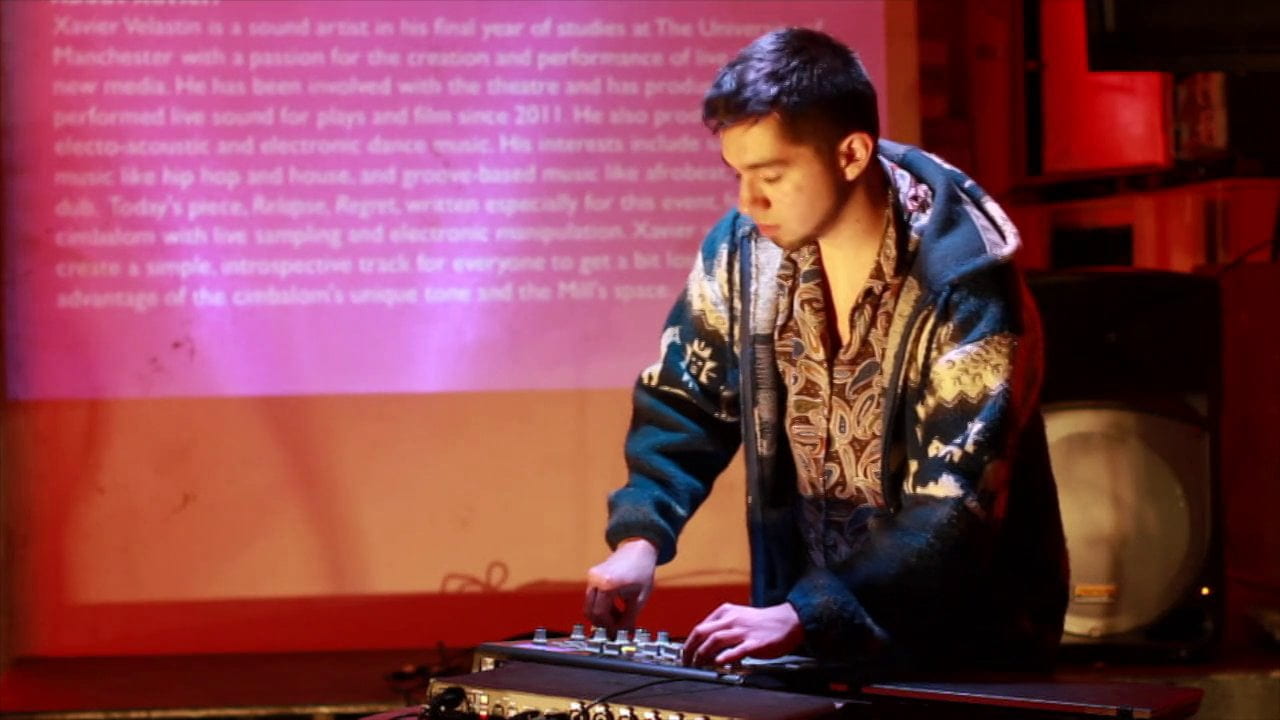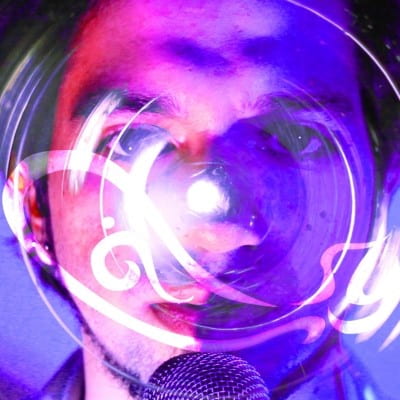Xavier Velastin (MA Sonic Arts, 2016) is a bipedal simian, best described as an electroacoustic composer, pianist, computer musician, theatre sound designer or sound poet, depending on when and where you happen to see him. He is of Chilean descent, born in London, and lives in Leeds.
[whalesong] runs from Wednesday, 1 August to Saturday, 4 August, 9-10pm at The Monkey House, Finsbury Park. £8 & £10 tickets available via the Camden Fringe.
‘The whale moves in a sea of sound:
Shrimps snap, plankton seethes,
Fish croak, gulp, drum their air-bladders,
And are scrutinised by echo-location,
A light massage of sound
Touching the skin.’
(Whale Nation, Heathcote Williams)
I am mostly a sound artist. I use digital technology to expand and undermine reality, I use performance as a political tool, and I sing into bowls of water because it sounds silly. I work full-time as an artist in Leeds, creating solo and group works, improvising and composing my own pieces, and designing sound for theatre. Sometimes I just sit in my room and listen to foil unfurling for an hour or two.

I graduated from Goldsmiths in 2016, making me a Master of Sonic Arts, and nobody can take that away from me now.
[whalesong] is a live performance, sound piece, an hour of electroacoustic absurdity running for four nights at the start of August. In it, I expand my body and voice to take the audience on an auditory tour through the anthropogenic noise in the oceans. It’s informed by two years of being pretty obsessed with the acoustic ecology of whales, which began with my dissertation for my masters at Goldsmiths. I use radio, air, contact and underwater microphones, motion-capture gaming controllers, an overhead projector and about four million miles of cable – all hooked up through programming environment max/msp – to create liquid, evolving sound-forms that constantly undermine the storytelling attempt. I use a flexible script-score inspired by concrete poetry, fluxus and absurdist theatre. Listen to Xavier’s work.
It’s really important for me – especially when using wanky, academic techniques and wanky, academic terms – to make something beautiful. Not necessarily pretty, but moving in an aesthetic way. I think a performance should be able to communicate clearly on a surface level of enjoyment as well as on a deeper one of analysis. It’s all very well devising a new compositional system or narrative language, but if nobody responds to it, it literally does nothing. And we’re not living in a world where nothing is nearly good enough.
[whalesong] ~ teaser ~ i hear the ocean

It was through Goldsmiths that I could delve deeper into the listening practices of Pauline Oliveros and Murray Schaefer, screw with electronics in the footsteps of Daphne Oram, and get involved in collaborative projects with people from the design, theatre and writing departments and the choreography course at Laban. I’m still in touch with, and make work with, the people I met through these collaborations. Running events there gave me the experience to produce theatre – another thing I do occasionally – and playing with all the toys in the music studios has meant I can find work as a sound engineer (though I hate it more than anything else). My experience was one of freedom, of a lack of pressure, and of basically a year of playing. It’s made me realise that play is actually the most powerful middle finger to the increasingly imperialist, nationalist, neo-liberal, racist, culturally repressed environment London, and the UK in general, is becoming. The students of performance making in the Theatre and Performance department understood this, and they are some of the most magical people I’ve met.
Whales are awesome.
I think my favourite whale is the Beluga Whale. Apart from looking really goofy, it has an incredible range of vocalisations. It sounds like a whole ensemble, a one whale band. It used to be called the ‘sea canary’ by whalers because of it’s loud and chirpy social calls. Listen to some here. It’s one of a relatively small group of whales, the toothed whales (Odontoceti), so it doesn’t do the long-range communication calls of the baleen whales (the humpback, the blue whale etc). They, like all cetaceans, are incredibly emotionally intelligent animals. One of my favourite wacky theories is that due to an enlarged amygdala – a group of neurones in the brain which plays a key role in processing emotions – and advanced echolocation capability, some cetaceans are able to literally hear each other’s feelings. It’s probably not true, but it’s going in the show because I’m not peer-reviewed and I can do what I want.
I got very wet making this performance and I hope you will too.
